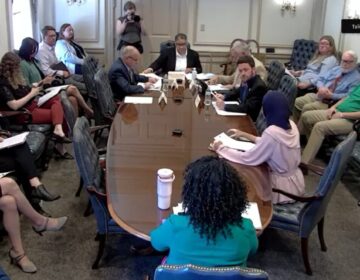Flawed delinquency records abound

According to city records, a West Philadelphia company, Neighborhood Restorations, is one of the biggest property-tax deadbeats in town, owing $247,000 on nearly 300 tax-delinquent parcels. But the city records are wrong, very wrong.
It all started in 1997, when Neighborhood Restorations persuaded then-Mayor Ed Rendell to give it hundreds of city-owned West Philadelphia lots, mostly abandoned rowhouses. At the time, it seemed like a great deal for the company, which renovates and leases low-income housing. Its plan was to rehab the shells and turn them into clean, well-maintained rental units, making it a good deal for the neighborhood as well.
Soon after, delinquent-tax notices started showing up. The city — which was supposed to have scrubbed the properties of all liens when it gave them to Neighborhood Restorations — was nonetheless still trying to collect taxes owed on the land going back many years before the company took title.
Alarmed by the notices, Neighborhood Restorations president Jim Levin contacted the city. He was told not to worry, that it all would be worked out.
“They said, ‘We’ll take care of it, we’ll take care of it, we’ll take care of it,’” Levin said.
They didn’t take care of it. Years passed, and the phantom debt owed by Neighborhood Restorations accumulated interest and penalties, growing ever larger. Levin reckons it topped $1 million at one point. The company hired lawyers (Levin estimated he spent close to $100,000 on legal fees) and eventually succeeded in getting much of the debt expunged.
But not all of it. There was still about $200,000 owed, according to records, debt that Levin says did not belong to his company. Eventually, Neighborhood Restorations decided the fight wasn’t worth continuing. During the city’s tax amnesty last year, the company wrote a check to cover the balance due.
The check cleared quickly enough, but according to city records, Neighborhood Restorations still owes. The payment, made over a year ago, has yet to show up on city property records.
“So, after 13 years, we are still trying to solve a problem that was created by poor performance of city agencies,” Levin said. “We saw a path to the conclusion using the amnesty program, and made the decision to pay a bunch of bucks we didn’t actually owe just to end it, and we’re still not there.”
The city’s property and delinquency records, particularly at the Sheriff’s Office and the Redevelopment Authority, have been so bad for so many years that such experiences are common.
When a property is sold at tax sale or transferred from the Redevelopment Authority to a private or nonprofit developer, old liens on those parcels are supposed to be wiped clean. But there are thousands of cases where that never happened, creating situations in which responsible developers and homeowners are told to pay past-due taxes they were never supposed to be responsible for.
Still more common are those instances in which tax-delinquent properties sold at sheriff’s sale continue to carry old liens.The sale process is designed to give buyers clean title — free of all debts and liens — but it often doesn’t work, according to frequent sheriff’s sale buyers.
The city is aware of the problems. Nutter administration officials said an effort under way to overhaul the Sheriff’s Office’s archaic computer systems would help. And the Redevelopment Authority is slowly but steadily clearing the titles of thousands of properties it long ago transferred not just to companies like Neighborhood Restorations but to nonprofit community-development corporations, some of which are erroneously classified as delinquents in official records.
“We have gone through a great deal of research to identify those accounts, and we’ve been working madly over the last year or so to settle those accounts, but there’s still quite a way to go,” said John Carpenter, deputy executive director of the Redevelopment Authority.
“None of them actually owe that money,” he said of the tax-delinquent properties owned by community-development corporations.
There are other quirks in city records. The official delinquency count includes 1,593 properties that do not exist anymore. Those are debts on parcels that have been subdivided, combined, or otherwise stricken from the property rolls. The city’s chances of collecting the $7.18 million owed on these phantom parcels are, clearly, low.
Contact the reporter at pkerkstra@planphilly.com
WHYY is your source for fact-based, in-depth journalism and information. As a nonprofit organization, we rely on financial support from readers like you. Please give today.





